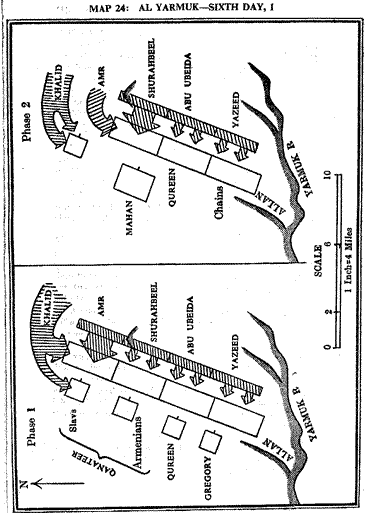|
Gregory had
hardly gone a few hundred paces when Abu Ubaidah caught up with
him. Now Gregory, who had deliberately controlled the pace of his
horse to let the Muslim overtake him, turned swiftly and raised
his sword to strike at Abu Ubaidah. His apparent flight had been
a trick to throw his opponent off guard. But Abu Ubaidah was no
novice; he knew more about sword play than Gregory would ever learn.
The Roman raised his sword, but that is as far as he got. He was
struck at the base of his neck by Abu Ubaidah, and the sword fell
from his hand as he crashed to the ground. For a few moments Abu
Ubaidah sat still on his horse, marvelling at the enormous size
of the Roman general. Then, leaving behind the bejewelled and gold-encrusted
armour and weapons of the Roman, which he ignored with his habitual
disregard for worldly possessions, the saintly soldier turned and
rode back to the Muslim front.
On the return of Abu Ubaidah, Khalid galloped
off to join the cavalry which had been positioned behind the corps
of Amr bin Al Aas. As he arrived at his place he gave the signal
for the general attack and the entire Muslim front surged forward.
The Muslim centre and left engaged the Roman armies on their front
but did not press the attack. On the right the cavalry galloped
round to the flank of the Roman left. From here Khalid despatched
a regiment to engage and hold the Roman cavalry of the left, and
with the rest of the Muslim cavalry struck at the flank of the Roman
left wing (the Slavs) at the same time as Amr assaulted their front
with extreme violence. The Slavs were stout fighters, and for some
time defended themselves courageously, but getting no support from
their cavalry and assailed from front and flank, they at last gave
way. Recoiling from the blows of Khalid and Amr, they fell back
into the centre -the Armenians.
As the Roman left wing crumbled, Amr moved
his corps forward, swung it to the left, and came up against the
left and now exposed flank of the Armenians, in whose ranks there
was considerable disorder as a result of the disorganised arrival
of the broken Slavs. Meanwhile Khalid wheeled his cavalry and engaged
the Roman cavalry of the left, which had been held in check by the
regiment he had detached a little earlier. The second phase of the
Muslim offensive began with Sharhabeel attacking the front of the
Armenians while Amr assailed their flank. Then Khalid struck at
the Roman cavalry of the left and drove it back from its position.
This cavalry group, having got a severe mauling from Khalid, galloped
away to the north and to safety. It had had enough of battle. (See
Map 24 below)

I shall not attempt to explain Khalid's
plan as it will become evident to the reader as we proceed with
the course of the battle. But one point that needs especial mention
is Khalid's intention with regard to the enemy cavalry. He had determined
to drive the Roman cavalry off the battlefield so that the infantry,
which formed the bulk of the Roman army, would be left without cavalry
support and thus be helpless when attacked from flank and rear.
In fast-moving operations the cavalry was the dominant partner,
and without it the infantry would be at a great disadvantage, unable
to move fast or to save itself by a rapid change of position.
|
